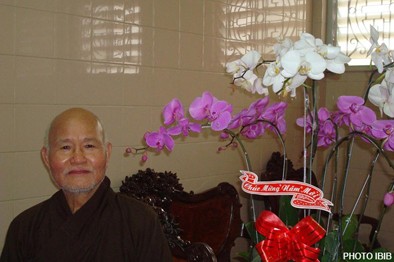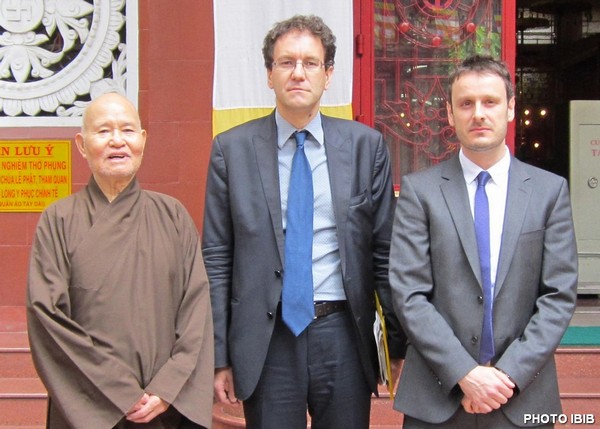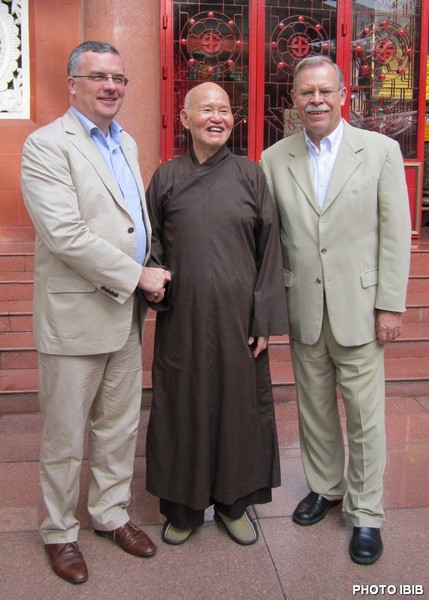PARIS, 1st February 2013 (VCHR) – The Most Venerable Thich Quang Do, Patriarch of the Unified Buddhist Church of Vietnam (UBCV) has been nominated for the 2013 Nobel Peace Prize. The deadline for nominations to the Nobel Peace Prize Committee in Oslo expires today, 1st February 2013, and the winner will be announced in mid-October. Nominations were submitted by a range of academics and legislators from the European Parliament, the US Congress and national parliaments of Italy and France. Two legislators evoked their own personal experiences with the UBCV leader.

US Congressman Ed Royce, Chairman of the House Foreign Affairs Committee recalled that he had secretly met with Venerable Thich Quang Do at the Thanh Minh Zen Monastery in Saigon in 2000 and “was subsequently condemned by the Communist government in Hanoi”. “Fighting for decades, Thich Quang Do has selflessly sacrificed his own safety and freedom for the rights of all in Vietnam. Imprisoned, beaten and isolated by the Vietnamese government, this brave man has dedicated his life to a struggle for human rights and religious freedom. I believe he exemplifies the ideals of the Nobel Peace Prize,” he wrote.
Italian Senator Marco Perduca said that the Vietnamese authorities had prevented him from boarding a plane with former MEP Marco Pannella in Cambodia to visit Venerable Thich Quang Do in 2008, pretexting that that they were “not welcome by the locals and would have created a security hazard”. “Anybody that has dedicated his or her life to nonviolence, and to the quest for justice, peace and human rights in a country that fabricates such excuses in order not to let European legislators meet fellow human rights defenders should be praised for his or her work”, he said.
Mr. Ramon Tremosa i Balcells, Catalan Member of the European Parliament from the Alliance of Liberals and Democrats for Europe (ALDE) and Mr. Noël Mamère, Member of the French National Assembly were amongst the personalities nominating Thich Quang Do for the 2013 Nobel Peace Prize.
On 29 January 213, Mr. Fabrice Mauriès, French Consul General in Ho Chi Minh City and Mr. Jean-Philippe Gavois, First Political Secretary of the French Embassy in Hanoi visited Venerable Thich Quang Do at the Thanh Minh Zen Monastery. This the first time the UBCV leader has received a visit from French diplomats since he was released from prison in 1998. The discussion focused on the situation of the UBCV and religious freedom in general. Venerable Thich Quang Do expressed concerns about the new Decree 92 on religions which came into force on 1st January 2013 which, he said, “tightens state control of religious activities in Vietnam”.

The French diplomats asked if things had changed in Vietnam over recent years. Venerable Thich Quang Do replied that much had changed, but the Communist Party and government’s authoritarian policies remained the same. “The people have no voice, they cannot participate in shaping their own destiny. The policy of the “free market economy with Socialist orientations” has failed to improve the living standards of vast sections of the population”. For this reason, the UBCV was determined to pursue its movement for human rights, he said. “The UBCV does not engage in politics, but we believe that all different social, political and religious families should have the right to participate in developing our country and preserving national sovereignty in face of Chinese encroachments on our lands”.
He called on France, with its long-standing relationship with Vietnam, to support the Vietnamese people’s demands for human rights and the rule of law. He commended France’s creation of the “Maison du Droit” in Hanoi to promote and study legal issues. In reply, Mr. Mauriès and Mr. Gavois stressed France’s deep attachment to individual freedoms and rights. They promised to report on the meeting to the French Ambassador in Hanoi, and hoped that the Ambassador would personally visit Venerable Thich Quang Do in the near future. The UBCV Patriarch handed the diplomats a document in French prepared for the meeting entitled “Memorandum sur la situation de l’Eglise Bouddhique Unifiée du Vietnam”.

On 14 December 2012, Venerable Thich Quang Do received a visit from the German Consul General Mr. Conrad Cappell, and Mr. Markus Löning, German Commissioner for Human Rights Policy, who was on a 6-day fact-finding trip to examine human rights and religious freedom issues in Vietnam. Mr. Löning said he had heard many reports about restrictions on the UBCV’s activities and Venerable Thich Quang Do’s house arrest. The UBCV leader described government repression against the UBCV since 1975, including his own 10 years in internal exile, his 5-year prison sentence in 1995 for organizing a humanitarian relief mission and his current house arrest at the Thanh Minh Zen monastery, deprived of freedom of movement and citizenship rights, and subjected to round-the-clock surveillance.
Mr. Löning asked why Vietnam deemed the elderly monk so dangerous that they kept him isolated in this way? Venerable Thich Quang Do replied: “Because I live according to the Buddhist principles of compassion and tolerance. I refuse to live in hatred and rancour like them. So they keep me locked up, in exile, prison or house arrest. In 2001, I launched an “Appeal for Democracy in Vietnam” calling for a multiparty system and free elections under UN supervision. If Hanoi’s leadership taken heed, they could have spared the people much suffering. But they are afraid of losing power and all the perks and privileges that go with it. That’s why they cling to the Party’s monopoly and refuse to open to political reforms”.
Mr. Löning told Venerable Thich Quang Do that he had raised human rights and religious freedom in his meetings with the Hanoi government. They were particularly embarrassed, he said, when he asked them why Vietnam didn’t follow Burma’s example by democratizing the country. He promised to ask his government to press for human rights progress in Vietnam, and call upon Vietnam and China to settle the problem of the East China Seas according to international law.
In a Memorandum on the situation of the UBCV which he handed to the German diplomats, Venerable Thich Quang Do raised the question of Germany’s bilateral “Rule of Law” dialogue with Vietnam, and in particular Germany’s cooperation with Vietnam on revising the Vietnamese Criminal Code. The UBCV leader urged Germany to press urgently for the abrogation of the vaguely-worded “national security” provisions in the Criminal Code which are routinely invoked to criminalize peaceful political and religious dissent.
In August 2012, US Ambassador to Vietnam Mr. David Shear visited Venerable Thich Quang Do. In November 2012, Australian Ambassador Mr. Hugh Borrowman paid a visit to the UBCV leader.
This post is also available in: French Vietnamese
 Quê Me Quê Me: Action for democracy in Vietnam & Vietnam Committee on Human Rights
Quê Me Quê Me: Action for democracy in Vietnam & Vietnam Committee on Human Rights




